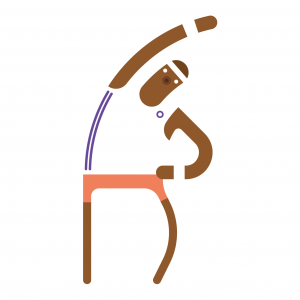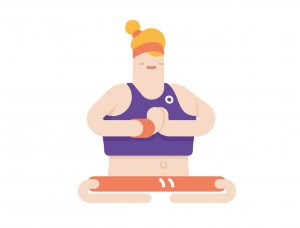Stress Survival Guide: Part 3 – Stress Busters
In the first two parts of our Stress Survival Guide (Good Stress, Bad Stress and Get the Best out of Stress), we show how small amounts of acute stress are inevitable, invigorating, even beneficial. In this article we focus on how to limit the negative effects, if we start to feel overwhelmed.
Stress Busters
Small doses of stress can be a positive force, but stress overload can be detrimental to performance and health. So how can we control unwanted stress? Coping mechanisms are different for everyone, and it’s worth returning to those that have worked for you in the past. And try some of these widely used strategies for alleviating the pressure and building resilience.
Knowledge & preparation increases our sense of control & reduces stress levels
Have a plan
With set piece events like exams, presentations or performances, be clear about the task and get organised: know what time you have, what you need to do, how and when you’re going to do it.
Exams revision plan
 Time – ideally leave yourself plenty of time, but it’s never too late to take control. Know what time you have available, allowing for regular breaks, socialising, relaxing and exercise etc.
Time – ideally leave yourself plenty of time, but it’s never too late to take control. Know what time you have available, allowing for regular breaks, socialising, relaxing and exercise etc.- Be clear about what you have to revise
- Decide how you’re going to do it – what methods work for you? Write notes, read a book, discuss with friends, get help from a tutor, online tests?
- When are you going to do it – make a timetable or set time-related objectives.
Tick off achievements as you go, so you can see you’re making progress, and reward yourself!
Get things into perspective
Of course exams/work do matter – but they are not the most important things in the world. And there is life after exams!
Jane Powell, CEO of the charity CALM (Campaign Against Living Miserably) offers this advice to anyone concerned about exams:
‘Ask the next five employers you meet about the exam grades of their staff. Trust me, they’ll have no idea and they’ll fumble too on what uni – if any – those staff attended. Even if you fluffed every exam going, and magnificently zeroed them all, they are still just exams. What do you want from life? What interests you most? How can you turn what turns you on into a career? Go investigate.’Jane Powell, CEO CALM
Social interaction builds resilience & speeds up recovery from stress
You may remember from Kelly McGonigal’s Ted Talk, that stress primes us to strengthen social relationships. (See Stress Survival Guide Part 2: Get the Best from Stress).
What happens? As part of the stress response, the body pumps out neurohormones, which motivate us to reach out for support (instead of bottling things up), and they also heighten empathy and compassion, which makes us more open to helping others. In addition, the hormone physically strengthens the heart. Social contact releases more of this hormone and so makes our stress response healthier.
Be social
Face to face, not just through social media. Enjoying time with friends is a great stress reliever!
 Share problems
Share problems
If you’re feeling anxious, be prompted by your stress hormones and seek support, don’t hide away and worry on your own. Talk to family, friends, tutors, student counsellors – lots of people will relate to how you’re feeling. Also be aware of others who are struggling – helping them could benefit both of you.
If you need help or just want to talk, click here for professionals & organisations experienced in supporting young people.
Good physical health increases resistance to stress
Adopt good habits – eat well, be active, get out, relax, sleep tight
Food tips
Ever heard of the ‘food-mood’ connection? There’s growing evidence to show that what we eat affects how we feel. And how we feel affects what we choose to eat or drink.
Snacks
Professor Robin Dando (Cornell Uni) reveals that when we’re stressed, food tastes less sweet, so we crave sugary, fatty comfort foods.(1) But sugary snacks make blood sugar levels spike then dip, which actually makes us feel even more anxious!
Nutritionist & chef Christine Bailey recommends that, when we’re suffering from stress, we should choose snacks that keep our energy levels and blood sugar stable, e.g.:
Blueberries give sweetness without upsetting blood sugar levels, and are packed with goodies like vitamin C and antioxidants
Pumpkin seeds, almonds, walnuts all help alleviate stress symptoms (1)
Drinks
Cut back on coffee. Too much caffeine gives you stress symptoms – increased heart rate, nervousness, insomnia, so it will make you feel worse.
Drink green tea instead – it contains L-theanine, which relieves anxiety and improves concentration. If you don’t like the taste, try a fruity flavour (my fave is lemon) or a more exotic blend like salted caramel! Click here for Twinings temptations.
Drink plenty of water, 6-8 glasses a day. Dehydration can cause stress and stress can cause dehydration!
 Eat a healthy diet
Eat a healthy diet
Nutritious food benefits mental health, improving energy levels, keeping you more alert and better able to handle stress. Eat fruit and veg rich in Vitamin C to boost your immune system e.g. oranges, berries, peppers and broccoli.
Limit junk food (but don’t forget the odd treat!)
Don’t skip meals
Your blood sugar levels drop, which could affect concentration and memory, as well as making you tired and irritable.
Find out more about food-mood here.
Keep active
 Apart from the obvious physical benefits, regular exercise is known to boost your mood: exercise pumps up endorphins, triggering a positive feeling which helps you relax and even sleep better.
Apart from the obvious physical benefits, regular exercise is known to boost your mood: exercise pumps up endorphins, triggering a positive feeling which helps you relax and even sleep better.
Aim for at least 30 minutes of moderate exercise, 5 times a week. Nothing manic, don’t panic! If you don’t love sport, go for a bike ride, take the dog for a walk or tie yourself in yoga knots. Scientists have found that ‘even 5 minutes of aerobic exercise can stimulate anti-anxiety effects’. But hey, you can do better than 5!
Sleep well
Don’t stay up cramming all night before exams – you really would do better to close your books and get a good night’s sleep! Hear the evidence in this fascinating Ted Talk – Dr. Shai Marcu (pediatric neurologist and sleep specialist) explains how sleep restructures our brains in a way that’s crucial for how our memory works. Click here for tips on getting a good night’s sleep.
Sleep deprived?
If you haven’t slept well before an important event like an exam, don’t panic. We’ve all survived the day after an all-night-out, so we know we can do it! Click here for some tried and tested tips for powering through the day after next to no sleep.
Mindfulness
 Mindfulness is known to alleviate stress, improve general wellbeing and even help you sleep better. It is a mind-body approach, which anchors attention on the present moment, using meditation techniques. Dr. Elena Antonova (Kings College London) explains how mindfulness helps to combat stress by reducing mind-wandering – worrying about the past or future, striving to do things better. (1) Focussing instead on the present relaxes us, and our less agitated brain state gives a sense of openness and clarity, so we can manage challenging situations rather than feel overwhelmed by them.
Mindfulness is known to alleviate stress, improve general wellbeing and even help you sleep better. It is a mind-body approach, which anchors attention on the present moment, using meditation techniques. Dr. Elena Antonova (Kings College London) explains how mindfulness helps to combat stress by reducing mind-wandering – worrying about the past or future, striving to do things better. (1) Focussing instead on the present relaxes us, and our less agitated brain state gives a sense of openness and clarity, so we can manage challenging situations rather than feel overwhelmed by them.
Key take-aways from our Stress Survival Guide
‘The harmful effects of stress on health are not inevitable – how you think and act can transform your experience of stress’Kelly McGonigal, Health pyschologist
We CAN deal with stress – we can’t control the triggers, but we can control our responses
We can use acute stress to our advantage – adopting a positive mindset will help us channel the energy to raise our game, and create a healthier physical stress response.
We can learn to manage stress levels by preparing for events like exams and interviews, with a clear achievable plan.
We can build resilience through social interaction – enjoying socialising, and reaching out for help when we need it; recognise the signs of stress and talk to friends, family or professionals. Offering support to others also strengthens our own coping mechanisms.
We can limit the negative effects of stress by maintaining a healthy, balanced, active lifestyle – good diet, regular exercise, enough sleep and mindfulness.
Source: GIPHY
Source: GIPHY
Read the earlier instalments of our Stress Survival Guide:
Part 1 – Good Stress, Bad Stress
Part 2 – Get the Best out of Stress
Further reading on dealing with exam stress:
Five Things CALM Knows about Exams – CALM
How to Deal with Student Stress – CALM
Find out more on dealing with stress:
SOS Professional Help
If you need help or just want to talk, click here for professionals & organisations experienced in supporting young people
Grad Bites: Dealing with Stress – Mindfulness
Claire Derry (business coach) talks about how mindfulness and meditation have helped her deal with some particularly stressful times in her life
Sources:
(1) The Truth About Stress BBC One (10 May 2017)
(2) Centre for Studies on Human Stress (CSHS)
(3) Helpguide – Stress Symptoms, Signs, and Causes
(5) Ted Talk: How to make stress your friend – Kelly McGonigal
(6) CALM (Campaign Against Living Miserably)

Please log in or sign up to comment